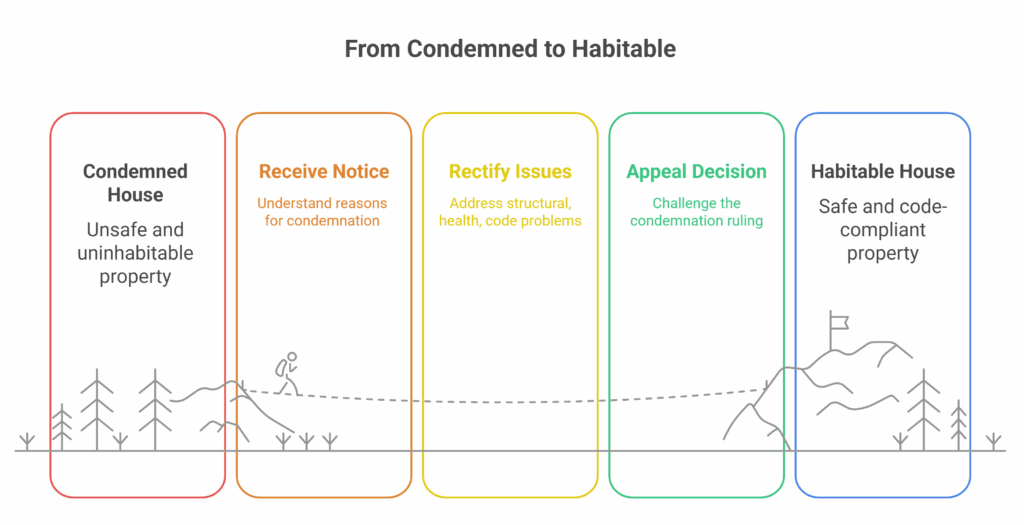Quick Answer: What Happens If My House Is Condemned?
If you’re wondering What Happens If My House Is Condemned?, the short answer is that your home is officially declared unsafe to live in due to serious structural damage, health risks, or code violations. Once condemned, you and anyone living there are required to vacate immediately. Utilities may be shut off, repairs could be mandated by the city, and in some cases, the property may even face demolition if it can’t be restored.
For homeowners, this often means dealing with legal notices, costly repairs, or even relocation. It’s a stressful situation, but understanding the process helps you prepare your next steps.
Now let’s dive deeper.

What Does It Mean When a House Is Condemned?
When a house is condemned, it is deemed by a local government authority (usually a city or county inspection department) to be unsafe for occupancy. This means no one can legally live in the property until the necessary repairs or changes are made. In some cases, the condemnation is temporary, and the homeowner may be given time to bring the property up to code. In other instances, especially with severe structural damage or hazardous conditions, the house may be permanently condemned and slated for demolition.
Common Reasons for Condemnation
There are various reasons a home might be condemned, including:
- Severe structural damage due to fire, flooding, or neglect
- Extensive mold growth or pest infestations
- Unresolved code violations, such as faulty wiring, lack of sanitation, or unsafe plumbing
- Illegal construction or zoning violations
- Vacancy and abandonment, leading to deterioration over time
Each city or county has its own criteria, but the overarching concern is health and safety.
What Happens After Your House Is Condemned?
Notification
Once your house is declared condemned, the city will issue a formal notice. You may receive a letter, and signs will often be posted on the property itself. The notice will include reasons for the condemnation and steps (if any) that you can take to appeal or rectify the situation.
Evacuation
If someone is living in the home, they will be ordered to vacate immediately. The property becomes off-limits to residents and sometimes even to the homeowner until specific repairs or inspections are completed.
Assessment and Appeal
Homeowners can often request a hearing or appeal the condemnation. During this time, you may have the opportunity to present evidence or a plan for repair. However, this process is highly time-sensitive, and any delay could result in fines or legal action.
Repairs or Demolition
If the city allows for repairs, the homeowner must comply with building codes and deadlines. In more severe cases, the city may move forward with demolishing the home — sometimes even billing the homeowner for the demolition cost.
Can I Sell a Condemned House?
Yes, you can sell a condemned property — but it’s not as straightforward as a traditional home sale. Most buyers using traditional financing (like FHA or conventional loans) will not be able to purchase a condemned property because it does not meet livability requirements. However, there are still options.
This is where house buyers in Texas come into play. These are typically real estate investors or cash buyers who specialize in purchasing distressed properties, including condemned homes. They often buy the home “as-is,” meaning you don’t have to make any repairs or bring it up to code before selling.
Benefits of Selling to House Buyers in Texas
If your house is condemned and you’re facing the emotional and financial burden of dealing with it, working with professional house buyers in Texas offers several advantages:
- Fast Closings: Transactions can often close in as little as 7–14 days.
- No Repairs Needed: Buyers will purchase the home in its current state, even if it’s uninhabitable.
- No Commissions or Hidden Fees: You can avoid paying agent commissions, listing fees, or closing costs.
- Legal Guidance: Reputable cash buyers are familiar with the process and can guide you through the paperwork required to transfer ownership, even in complex condemnation cases.
- Avoid Demolition Costs or Fines: Selling quickly may help you avoid city-imposed demolition or cleanup fees.
Moving Forward After Condemnation
Being told your home is condemned can feel devastating, especially if it was your primary residence or a property with sentimental value. However, there are practical steps you can take to resolve the situation without further stress or financial strain:
- Consult an Attorney: Especially if you plan to appeal or need to understand your rights and obligations under local laws.
- Speak With a Contractor: Determine if repairs are feasible and affordable.
- Get an Inspection: If selling, having a full understanding of the property’s condition can help set expectations.
- Reach Out to Local House Buyers: Cash buyers can make you an offer quickly, helping you offload the property without additional expense.
Sometimes, letting go of a condemned property is the best decision — especially when restoring it would cost more than it’s worth.
Turning the Page: Moving Forward After Condemnation
Condemnation doesn’t mean your story as a homeowner is over — it simply means it’s time for a new chapter. Whether you inherited a dilapidated property, fell behind on maintenance, or were struck by an unfortunate event like fire or flooding, you still have options.
If you’re looking for a fast, fair, and stress-free way to move on from a condemned home, professional house buyers in Texas are ready to help. They understand the unique challenges of selling such properties and offer solutions tailored to your situation.
Call us anytime at 713-561-5162 or connect with us on our website and we’ll lay out all of your options for your specific situation.
